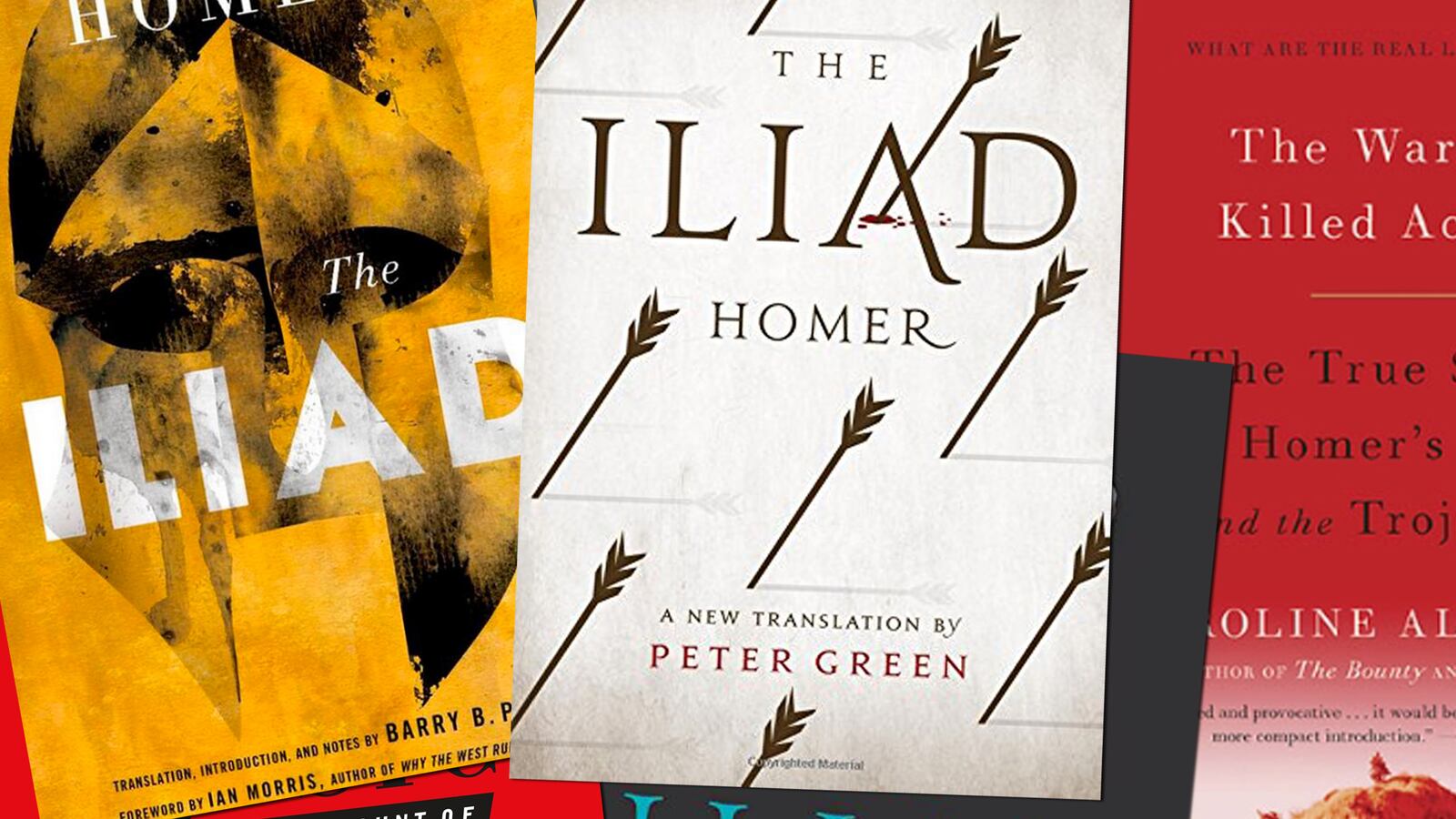Pop quiz: Which is greater? (a) The number of Republican presidential candidates or (b) the number of new English translations of Homer’s Iliad published in the last decade.
If you answered (a), you’d be right, but by a very slim margin. Last month, with the arrival of Caroline Alexander’s version of Homer’s great epic—the first ever by a woman, if that matters—the Iliads drew just one shy of the nine Republican contenders who appeared in December’s debate. Given the increasingly rapid pace at which new Iliads keep emerging, we will likely see another before the Iowa caucuses—all this while older versions of the poem, some dating back centuries, continue to get reissued with new notes, introductions, and cover illustrations.
For readers, and for teachers like myself, the range of choice has become bewildering. Some translators prefer a five-beat line of verse (like Shakespeare’s), others something closer to the six-beat line of the original; still others blend the two, or, as in Alexander’s case, stick to no clear metrical scheme at all (“a cadence… which varies from verse to verse,” as she describes it in her introduction). Do you fancy rhymed couplets? The once-great versions by George Chapman and Alexander Pope have been recently repackaged, as has the prose version by Victorian novelist Samuel Butler. And for those who prefer modernist twists on ancient classics, Christopher Logue’s War Music—a reimagining of Homer’s epic, in an imagistic style—will appear in a new, more complete version next month, augmented by material Logue left unfinished in his declining years, after working on the poem, on and off, for five decades.
Translation proliferation is certainly not among the 10 worst of the anxieties afflicting the modern world, but it is of a piece with others higher up the list.
Swarthmore psychologist Barry Schwartz begins his 2005 book The Paradox of Choice with a stroll through a midsize American grocery store, with its hundreds of cracker varieties, scores of sunblock choices, and seven varieties of Cheerios (a number that has since expanded well into double digits). Those already oppressed by the overabundance of the malls and markets now have to cope with it also in the bookstore, a place one used to go knowing exactly what one wanted and what one was going to get. The Barnes & Noble website lists 173 books under the words “The Iliad,” while Amazon lists 179 (many of these are summaries or reader’s guides, but dozens are full translations).
It was not ever thus. Classics graduate students in the 1980s (of whom I was one) debated the relative merits of Richmond Lattimore and Robert Fitzgerald, the only two Iliads then in wide circulation. A new version by Robert Fagles appeared in 1990, and for most of that decade, the three Rs had the field of Homer translation entirely to themselves. Then Stanley Lombardo entered the ring in 1997 with his streamlined and brashly colloquial style, in an edition that shocked the academic world by putting on its cover a photo from the D-Day invasion. Since then, the graph of new Iliad translations has followed a parabolic curve.
Trends in publishing have led to greater diversity of many Greek and Roman texts, but none have multiplied quite so fast as The Iliad, in part because none are so widely assigned by college teachers. As the Classics’ share of the curriculum has shrunk, Homer has remained the blue-chip stock that belongs in every portfolio, the one ancient author that the entire college community—including students, who increasingly challenge faculty on the makeup of their reading lists—can agree is worth reading. So The Iliad, and to a lesser extent The Odyssey, can be counted on to produce a steady stream of revenue for publishers, every time fall and spring term book orders come due. (It was reported in The Wall Street Journal that Caroline Alexander’s version, despite being the “new kid on the block,” would have an initial print run of 30,000, and that Robert Fagles’ 1990 version has by now sold more than a million.)
The profit motive may explain the spate of new translations, but the proliferation of translators is more puzzling. Given that a responsible Hellenist needs years of labor to render more than 15,000 lines of Greek verse into passably accurate, euphonious English, and can expect very little in the way of either financial reward or (in the ranks of academia at least) professional advancement, whence comes this great throng of men, and now one woman, who follow in Homer’s trail like enchanted children following the Pied Piper?
Caroline Alexander is an interesting case in point. A Rhodes scholar and Classicist turned journalist and nonfiction writer in the 1990s with articles in The New Yorker and a best-selling book on Shackleton’s Antarctic expedition, she seemed to have cast her lot with prose, not poetry, and to have left the ancient Greeks behind. Then in 2009 came The War That Killed Achilles, her exploration, for a wide readership, of the meaning of The Iliad. Alexander took Homeric quotes from the Richmond Lattimore version of 1951, but also included her own version of a single chapter of the poem—“Not… because it was felt that Lattimore’s work could be improved upon,” she wrote, “but because… it seemed an impertinence to lift an entire chapter of another scholar’s work.” That taste of translation seems to have changed her mind as to whether Lattimore could be bettered, for she devoted much of the next five years to doing just that.
Even more curious is the case of Peter Green, the Greek historian who came out with a version of The Iliad this year at the age of 91. Green got his first taste of translating Homer in the early 1950s, as part of a team assembled by the BBC to produce a radio version of The Iliad—a team that also included Christopher Logue. But he thereafter devoted his energies to more scholarly enterprises, producing widely admired studies of Alexander the Great and the Hellenistic age. Translations of works by Ovid and Catullus showed he also had an ear for poetry, but nothing could have predicted that, following his retirement from teaching, he would devote the last stage of an illustrious career to Englishing Homer.
“From time to time—not least when I saw another version of The Iliad or The Odyssey collecting tribute in the headlines—a sad twinge of regret… would nag at me,” Green writes in his preface. “But it was only a year ago, when I realized that on my next birthday I was going to 90, that I asked myself what I had to lose, even now, by tackling The Iliad.” It’s a rare sort of person who puts “translate The Iliad” on his bucket list, but Green reports that he has found great satisfaction in meeting this challenge, and that he has now embarked on The Odyssey, a task that will surely take him into his mid- if not late nineties.
Then there’s Barry Powell, an emeritus professor at the University of Wisconsin who built his reputation on academic studies like Homer and the Origin of the Greek Alphabet. After an editor at Oxford University approached Powell about translating Homer instead of analyzing him, the hook was set. “When I told my friends about this project, they said, ‘But hasn’t Homer already been translated many times?’ Yes, sure, I tried to explain, but not by me,” says Powell in the preface to his 2014 Iliad. One suspects that this Macbeth-like story line—in which an acquisitions editor plants the seed of ambition in the mind of a prominent scholar, offering a new and undreamed-of future—has played out many times among the ranks of recent translators.
The generations of men are like leaves on a tree, Homer wrote in Iliad Book 6, and new versions of his poem have occupied many leaves and have required the felling of countless trees. The diversity of styles and voices in the new publishing landscape is in many ways a good thing, since readers—at least, those willing to do an hour or two of research—can find an Iliad that closely suits their tastes. But there are inevitable downsides to a world in which nearly anyone, whatever their poetic talent, can fulfill a lifelong dream by getting their version of The Iliad into print. It might seem hyperbolic to say ”Even my neighbor is doing one,” but in my case it’s literally true, since poet Charles Stein, author of an already-published Odyssey, now well into a translation of Homer’s other epic, lives just down my street.
Before committing to any new Iliad, however, readers are well advised to consult Daniel Mendelsohn’s 2011 New Yorker squib, comparing recent versions and deciding that Alexander Pope’s, just now reaching its 300th anniversary, is “at once the grandest and most minutely detailed there is ever likely to be.”
So much for progress.






